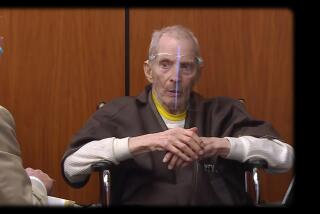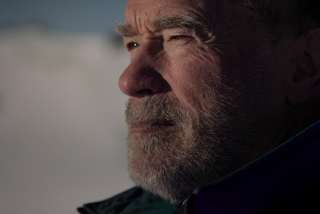Armand Deutsch, 92; Arts Patron, Film Producer, Friend of Reagan
- Share via
Armand Deutsch, a former president of the Center Theater Group’s board of directors and a member of the Presidential Task Force on the Arts and Humanities, has died. Deutsch was 92.
Deutsch, who for a time was a film producer for Metro Goldwyn Mayer, died Saturday of complications from pneumonia at Cedars-Sinai Medical Center in Los Angeles, according to his grandson, Donald Granger.
His longtime friendship with Ronald Reagan, during his time as both governor and president, helped keep him in the limelight of Los Angeles society. Reagan appointed him to the arts and humanities task force in 1981.
Deutsch and his wife, Harriet, attended Reagan’s inaugural celebrations as well as the regular New Year’s Eve parties for the Reagans that Walter Annenberg and his wife, Lee, gave at their Rancho Mirage estate when Reagan was president.
Deutsch, who came to Hollywood in the mid-1940s to work in films, met the Reagans before they were married and they quickly became friends.
Deutsch produced a number of films, including “Ambush” (1949), a Western starring Robert Taylor; “The Magnificent Yankee” (1950), a biography of the American jurist Oliver Wendell Holmes; and “Carbine Williams” (1952), starring James Stewart.
An active member of the Los Angeles arts community for many years, Deutsch served on the board of the Los Angeles Music Center from 1970 until 1985. He was a “benefactor donor,” a title given to contributors of $300,000 or more.
He served as president of the board of the Center Theater Group, then comprising the Ahmanson Theatre and the Mark Taper Forum, from 1972 to 1976.
“A challenge for the president of the board and the artistic director is to do good work, which costs money, and do works that people want to see,” said Gordon Davidson, who was artistic director of the Taper when Deutsch became president of the board. “Ardie was very supportive,” Davidson said.
Deutsch also served on the board of Cedars-Sinai Medical Center, starting in the 1960s. He became a trustee of the hospital in 1980.
From childhood, he was accustomed to moving in the highest social circles. Born and raised in Chicago, he was the grandson of Julius Rosenwald, chairman of the board of Sears, Roebuck & Co.
At 11, Deutsch wrote years later, his socialite parents and wealthy background made him the intended victim in the famous Leopold and Loeb case.
“My murder, as I have always thought of it, was carefully planned to take place in Chicago on May 24, 1924,” Deutsch began in a 1996 essay about the case for the Chicago Tribune.
Two teenage boys Deutsch knew, Nathan Leopold and Richard Loeb, planned the crime and, according to Deutsch, chose him as their target because of his standing as the Sears, Roebuck heir. Their motive was nothing personal. The act “would provide extensive fame,” Deutsch wrote.
He was spared because the family chauffeur picked him up that day after school -- a change from his habit of walking home -- and took him to the dentist.
Leopold and Loeb killed 14-year-old Robert Franks instead. Clarence Darrow took the case. One of the most powerful trial lawyers of his time, Darrow managed to spare Leopold and Loeb from the death penalty. They were sentenced to life in prison. Loeb was killed in prison and Leopold was granted parole in 1958.
The media sensation caused by the trial led Deutsch’s parents to transfer him to a new school. On his first day there, one of the students asked for his autograph. “It marked the beginning of an odd celebrity status that to this day is part of the fabric of my life,” Deutsch wrote.
“This is not surprising. Crimes of the century differ from the garden variety of murders. They involve wealth, celebrity and powerful attorneys, and live on for decades after the verdict has been rendered.”
Deutsch graduated from the University of Chicago and began his career in the investment business, first in Chicago, later in New York City.
After serving in the Navy during World War II, he moved to Los Angeles to pursue a career in the movie business. In addition to his production work, he at one time was on the board of directors of Warner Bros.
He also wrote a book, “Me and Bogie, and Other Friends and Acquaintances From a Life in Hollywood and Beyond” (1991).
When Reagan ran for Republican governor of California the first time, however, Deutsch told his friend he could not vote for him. At the time, Deutsch was a committed Democrat. “Nancy cried,” Deutsch recalled in a 1991 interview with the Chicago Tribune. Reagan, however, “walked around the table and put his arm around me and said, ‘Vote for anybody you want. It’s not going to break our friendship,’ ” Deutsch recalled.
Deutsch’s first marriage ended in divorce. He is survived by his wife, Harriet, four children, and several grandchildren and great-grandchildren.
More to Read
The biggest entertainment stories
Get our big stories about Hollywood, film, television, music, arts, culture and more right in your inbox as soon as they publish.
You may occasionally receive promotional content from the Los Angeles Times.










